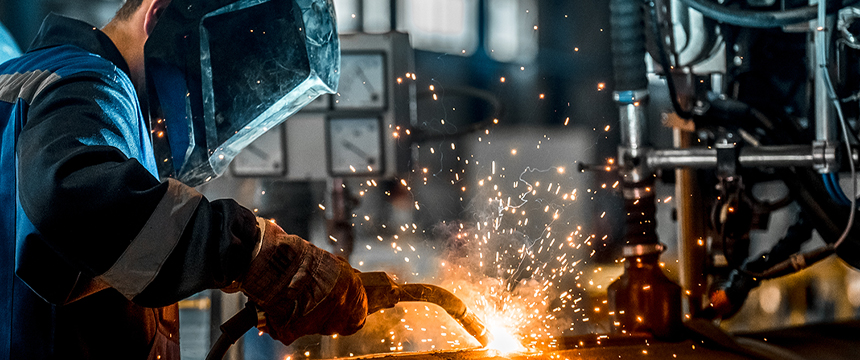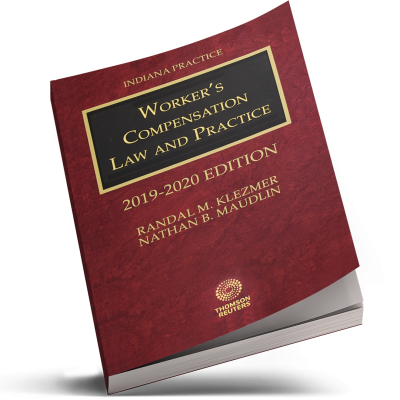Live Help NOW  317-569-9644
317-569-9644

If you live in Southern Indiana and the Louisville metropolitan area, and have been injured at work, you’ll need a comprehensive guide to figuring out what steps to take to heal and to receive the benefits you’re entitled to. The attorneys at Klezmer Maudlin, PC are Jeffersonville-based experts who have helped hundreds of injured people from throughout Southern Indiana navigate their claims, secure the maximum compensation they are entitled to and move on with their lives. Although our office in Jeffersonville is newly opened in the Fall of 2019, we have been in practice for over 25 years. As a firm we have all the resources you need to determine how best to proceed with your Workers Comp claim in Indiana or Kentucky.
The Workers Compensation Practice Manual, authored by Randy Klezmer and Nathan Maudlin, serves as a resource for all issues related to the administration and practice of workers compensation law in Indiana.
If you don’t need a comprehensive resource, and just have a few questions, use this guide as a reference for Workers Comp in Louisville, Jeffersonville and all of Southern Indiana questions about:
- The law
- The terminology
- The claims process
- The appeals process
- The people you will encounter
- How to handle disputes
- The difference between personal injury and workers compensation
- And more
I. Indiana Workers Compensation Law
If you are an injured employee and wish to pursue a claim for Workers Compensation benefits, it’s important to understand the laws that protect you and provide you with a framework for making your claim. A great resource for Workers Compensation law in Indiana is the Workers Compensation Board of Indiana . This website will provide you with all the resources you need to make your claim, handle a dispute, access the newest amendments to the law, and get a full picture of the legal framework that will support you as an injured employee in Indianapolis and the surrounding cities.
If you want to access the most current and comprehensive resource on the Indiana Workers Compensation Law, you may want to consider purchasing the Workers Compensation Law and Practice, 2018-2019 ed. (Vol. 29, Indiana Practice Series). It provides the most detailed and comprehensive overview of the issues pertaining to the administration and practice of workers compensation law in Indiana. Both claimant’s and defendant’s counsel, along with their clients, will find this volume an invaluable resource. The book features:
- Discussion and analysis of significant caselaw
- A forms chapter
- The complete text of the Indiana Workers Compensation Act
- A table of laws and rules
- A table of cases
II. Kentucky Workers Compensation Law
If you live and/or work in Kentucky and wish to make a claim in Kentucky, a comprehensive website for your reference is the Kentucky Department of Workers’ Claims. Many people who live in Southern Indiana may work in Louisville, Kentucky and the surrounding areas. Therefore, it’s important to know that you have options about where you file your Workers Compensation claim.
An employee is entitled to select the jurisdiction they wish to file their claims based on these three basic principles:
- An Employee is entitled to file a claim in the state their work is principally localized
- An Employee is entitled to file a claim in the state where they were injured
- An Employee is entitled to file a claim in the state where they live
Check out this case study about an injured worker from Southern Indiana who sought compensation for his injury through a third party lawsuit against the general contractor.
III. Understanding Workers Compensation Terminology
The Workers Compensation process can be daunting, if for no other reason than there are lots of acronyms and terminologies that can be confusing. Before you begin your claim, take a moment to familiarize yourself with the terms that will be used to define and resolve your case. Here are some of the most often-used acronyms and terms that you’ll want to understand as you pursue your claim:
- AOE/COE: Arising Out of Employment, and in the Course Of Employment or caused by a workers job and occurring while working. An injury or illness must be AOE/COE to be covered by workers compensation.
- CT: cumulative trauma (injury). An injury that was caused by repeated events or repeated exposures at work. (Examples include hurting your wrist from doing the same motion over and over or losing your hearing because of constant loud noise.)
- DOI: date of injury. If the injury was caused by one event (a specific injury), this is the date of the event. If the injury was caused by repeated exposures (a cumulative injury), this is the date that the worker became aware that the injury was caused by work.
- IME: independent medical evaluator. A physician selected by the judge to determine the cause of the medical condition, the permanent impairment of the injury, and/or the permanent limitations, if any, that the worker has sustained.
- MMI: Maximum Medical Improvement. A point when an injured person can no longer improve his/her condition – either having reached a plateau in their healing process or fully recovered or stabilized. No further improvement is expected.
- PTD: permanent total disability (benefits). Payments to a worker who is considered permanently unable to compete in the open labor market. (Also see the Workers’ Compensation Benefits Increases .)
- PD: permanent disability (rating). The numerical assessment of a physician’s description of an injured workers permanent disability. This is derived by applicant of the functions in the permanent disability rating manual to the language used by the physician to describe the disability, usually involving workers compensation terms.
- TPD: temporary partial disability (benefits). Payments to a worker who can do some work while recovering but who earns less than before the injury.
- TTD: temporary total disability (benefits). Payments to a worker who cannot work at all while recovering.
- Third party case: a third-party case is a lawsuit against another entity (aside from your employer) who holds at least some degree of responsibility for your on-the-job injury. There are definitely benefits to filing a third party lawsuit if you have substantial injuries. Learn more about how to determine if you have a legitimate third-party case.
Need more information about Workers Compensation in the Indianapolis area and throughout Indiana?
Check out this comprehensive website dedicated specifically to Workers Comp in Indiana.
IV. Making a claim and knowing when to consult with an attorney
If you are an employee and have been injured in the state of Indiana, you may file your own workers comp claim. You can find all the forms you need here, including:
- First Report of Injury – SF 34401**
- Application for Review by Full Board – SF 1042
- Application for Adjustment of Claim – SF 29109
- 2nd Injury Fund Forms
- And more
If you are confused or overwhelmed by the process, you may consult with an attorney to help you understand your case fully. Seek a free evaluation of your case from the Indianapolis-based experts at Klezmer Maudlin, PC to know whether your claim is compensable or not.
A compensable claim is a claim covered under the Workers Compensation Act. For a claim to be covered under Workers Compensation, the injury must arise from an accident out of and in the course of employment. However, it is important to note that just because an injury occurs at work does not mean the injury is covered under the Act. Furthermore, just because the injury occurs during work hours does not mean the claim is automatically covered.
The other reason to consult with a professional is to understand whether or not your case may involve a third-party who is responsible for your injury. Pursuing a third-party claim can be beneficial to you in the case of severe injuries. Typically, valid third-party claims result in higher awards than workers compensation claims.
Filing a lawsuit against a third party can be done on your own, but you will have more success if you enlist the help of experienced lawyers who understand your injury, the law and the judicial process. They will help you receive the maximum compensation for your injury. Hiring the right workers comp attorney in Indianapolis is important. You want to know that you are choosing the most experienced, most successful attorneys who will work compassionately with you and successfully represent you in maximizing your claim.
What makes a good workers compensation attorney?
Attorneys who know what they are doing in workers compensation add value to your case and are honest with you about your case. They also know the Indianapolis landscape and the doctors who review cases. Take time to interview attorneys to determine who will be most successful in getting you the maximum amount of money for your case.
V. Who is responsible for what in the Workers Compensation claims process?
Workers Compensation is a type of insurance purchased by employers which provides coverage for the employer and the worker. It protects the employer from lawsuits, while providing benefits for the worker in the case of an injury or illness while working.
Though an employer is required to provide workers comp coverage, you are responsible for documenting your injuries and initiating a claim. Once a claim is initiated, there will be other people who become involved in your case.
- An employer-appointed doctor: Indiana law states that your employer is responsible for “furnishing” your medical providers. Courts have interpreted this language to mean that your employer is allowed to assign your doctor/physical therapist/etc. to you, and that you do not get to choose who provides your care.
- A Nurse Case Manager: (NCM) is a liaison among the medical provider, the employer and the injured worker. While not an indispensable player in the Indiana workers compensation process or specifically governed by the Workers Compensation Act, the nurse case manager can be an integral part of coordinating medical treatment and the stay-at-work/return-to-work process.
Ideally, a nurse case manager is both a aliaison and an advocate with integrity. However, sometimes that’s not the case. If you want are concerned that your NCM is not a true patient advocate, read more about the role and what you should expect from your NCM.
VI. What should you do if your claim is denied?
In Indianapolis and throughout the state of Indiana, the workers compensation program is considered is a “no fault” system. That said, an employer still has the right to deny a claim under certain circumstances. A denied claim occurs when your employer or the workers compensation insurance carrier does not believe your claim is compensable (warrants being paid). There are 6 reasons a claim can be denied. Read more about them here.
If your claim is denied, like the CNA in this case study, or your employer determines your injury did not happen as a result of your work, like the worker in this case study, you have recourse. You’ll want to contact an experienced Indianapolis-based workers compensation attorney to discuss your case and how to proceed to receive the settlement you deserve.
VII. Navigating appeals
If you live or work in the Indianapolis area or throughout Indiana, and wish to appeal your case, either because your claim was denied or you feel the settlement was deficient, you should seek the counsel of an experienced Indianapolis-based workers compensation and personal injury attorney. Presenting a workers compensation case to a judge will involve technical provisions of Indiana law, rules of evidence and rules applying to the exchange of medical information. Failing to understand and follow the rules could cause you to lose your case.
A knowledgeable workers compensation attorney can guide you through the complicated administrative appeals process and keep track of the statutes of limitation that must be met to avoid having a claim rejected.
Appeals cases, such as Midwest Equipment & Supply Co. (Appellant-Respondent), v. James Garwood (Appellee-Claimant), where the attorneys at Klezmer Maudlin, PC represented James Garwood, are good examples of how valuable an experienced attorney is in handling cases that are heard by the Court of Appeals in Indiana.
Want to find out more about how others have successfully appealed their cases?
We have several case studies that involved successful appeals resulting in greater compensation.
VIII. Personal Injury and Workers Compensation
If you’ve been injured on the job, you may be wondering whether you should file a Workers Compensation claim or a personal injury lawsuit. There are fundamental differences in these approaches. First of all, workers compensation claims are handled by the Workers Compensation Board of Indiana while third-party lawsuits are handled by civil courts. Additionally, there are differences in the type of compensation you will receive, whether you are awarded benefits for pain and suffering or future financial losses due to your accident.
We represent injured employees throughout the Indianapolis area and all of Indiana. This includes, Marion, Lebanon, Greenfield, Lafayette, Crawfordsville, Columbus, and Anderson.
Do you wonder if you have a personal injury claim?
Learn more about the differences and how an experienced attorney can help you by watching this brief video.
IX. Frequently Asked Questions About Workers Compensation Claims
Even when we think we’ve covered it all, there’s always specific questions our clients have about their unique questions. Over the life of our firm, we have dealt with a wide range of cases, and can anticipate lots of questions our customers have.
Here is a link to some of the most frequently asked questions and answers, including:
- Can I sue my employer?
- Can I recover for pain and suffering?
- Can I trust the insurance carrier to pay me what I rightfully deserve?
- Should I request an Independent Medical Examination?
Additionally, here are some questions we’ve spent a little more time addressing:
- Can your employer require that you seek medical care outside of working hours?
- Am I entitled to temporary partial disability benefits?
- Do I have a third-party case?
- Should I handle my own workers compensation case?
- If I’m injured by a co-worker, who is responsible?
- Who chooses my doctor for work-related injuries?
- How much money can I receive from my claim in Indiana?
- What rights do undocumented workers have when they are injured on the job in Indiana?
- What do I do if my employer is violating my light duty restrictions?
- What should I do if my claim is denied?
If you have ANY questions about your case, click here to contact the experienced Indianapolis-based workers compensation attorneys at Klezmer Maudlin, PC for a free, no obligation consultation.
Table of Contents
I. Indiana Workers Compensation Law
II. Kentucky Workers Compensation Law
III. Understanding Workers Compensation Terminology
IV. Making a claim and knowing when to consult with an attorney
V. Who is responsible for what in the Workers Compensation claims process?
VI. What should you do if your claim is denied?
VII. Navigating appeals
VIII. Personal Injury and Workers Compensation
IX. Other Frequently Asked Questions About Workers Compensation Claims

Want to go deeper into Workers Compensation law?
Get the book featuring:
- Discussion and analysis of significant caselaw
- A forms chapter
- The complete text of the Indiana Workers Compensation Act
- A table of laws and rules
- A table of cases

